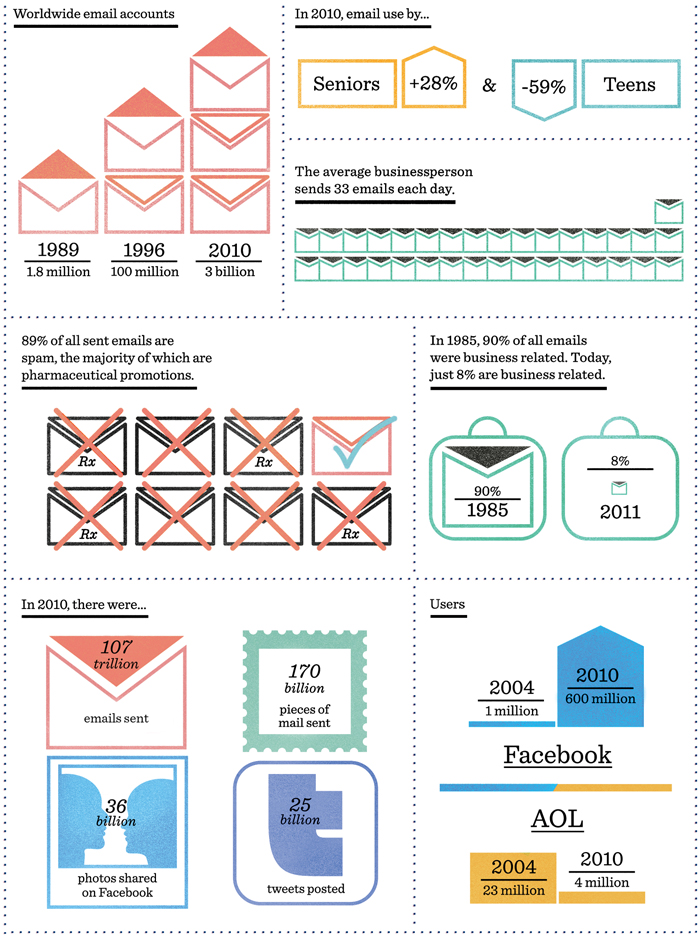June 28, 2011 at 7:20 am, by Carl
Email just turned 25. Happy Birthday you frustrating form of communication. My wife loves to tell the story of how my initial reaction to email was pretty harsh. Back in 1995, I had started a new job as the Student Pastor at a mid-sized city church. The leadership was excited to announce that we were going to get to use email.
The idea of communication through email had gained some popularity during the 1980s when the Internet was mostly a series of gated communities like CompuServe, Prodigy and AOL. Within these groups, all paid services, the members could write one another. The other type of group communication was a “List Serve” which became part of the various movements that moved the Internet from walled gardens into the wild wild web that we all know and love.
In any case, as the leadership announced we would use email, I was dismissive, telling my wife famously that I would never use email. Fast forward less than ten years, and I was now the spiritual leader of a small community with a large number of geeks. We intentionally built our community around the idea of being connected 24/7 electronically through email and our own message board.
But, along the way through the first decade of the 2000s, something interesting has happened to email. Check out this infographic from Fast Company celebrating the 25th birthday of email (don’t argue with me if you think email is really older; take it up with them—LOL).
The numbers have grown with over 100 trillion emails sent in 2010 from over 3 billion accounts. Yet, check out the graphic to the left of that—teen usage of email has decline 59% over the years. Its not hard to figure out why—with the recent explosion of the “mini-computer” (what we used to call a phone), Twitter and Facebook, teens enjoy the quick, pithy, chatter that allows for them to quickly communicate with their friends. But there’s more—check out the sad reality of the type of email. Almost 90% of email is spam—a waste of our time.
I know many people whose email has literally thousands of unopened emails. It is so easy to get overwhelmed with the amount of messages, get tired of trying to deal with spam filters, and then just miss the very few real email messages coming your way.
What does that mean for you and me? It means the future of communication is in flux. Less than two decades ago, the majority of people use landline-based phones to talk to each other. In the early 1990s, less than 10 million people had a cell phone subscription in the USA. Today, the number is over 250 million in the US, and an astonishingly 4 billion cell phone subscriptions worldwide (about 60% of the world population).
In the past two years, the mini-computer has taken the world by storm and cell phone companies race to actually implement 4G speeds (so far, no one really has). In the meanwhile, how do we actually communicate with each other? Moreover, what do groups and organizations do?
At my College, we eagerly embraced the move to email with the creation of our own walled garden in order to protect security of our students. For the past 10 years of my employment with them, however, we have faced a losing battle with students actually using their College email as we wish. There have been many accounts of students suffering the loss of grades, financial aid or just general information from the College because the student didn’t check their email.
Yet, if the usage of email has declined by 59% among teens, if most emails are junk (see the other info bit that only 8% of emails are business related—jus another way to say “it’s mostly all spam.”), then why WOULD a teen want to check email? If they post something on facebook, then anyone of their friends can read the cool bit of news. Or, if they want to talk directly to someone, they can just text or IM them.
Maybe what will happen is email will continue to grow and mature, with users becoming more confident in the spam protection ability of their computer programs. Or, maybe the walled community idea will come back in strength, maybe facebook is merely the new Prodigy, without the subscription plan. Then, you can know that all the messages are from trusted friends and you’ll check that more often. Perhaps the end result is that we are morphing, in some ways, back to the pre-home computer days.
Regardless, as you step forward in your career or in your relationships, be aware that communication as we know is not standing still. And, maybe that’s a good thing. Perhaps it will bring a new highlight of the value of real information exchange and relationship growth that communication should be. Last week, my middle daughter was lamenting that she never gets any real mail (snail mail). I told her, “write someone a letter; start a pen-pal.” She didn’t know what I meant, but perhaps in the days to come, she’ll actually break out the paper and pen.
Leave a Reply
Inappropriate or irrelevant comments will be removed at an admin's discretion.














1 Comment to Are you being heard?
Trackbacks